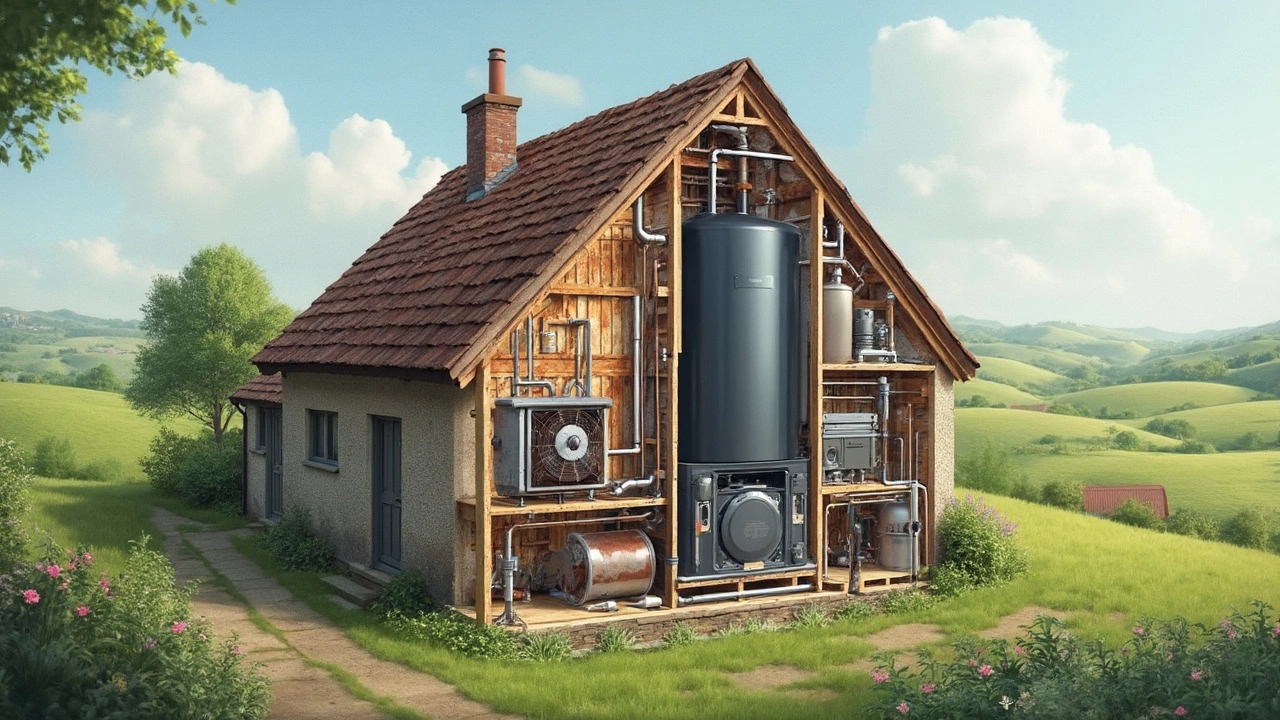You're probably wondering if replacing a boiler is really a huge job. It’s definitely bigger than changing a light bulb, but it's not exactly like remodel your entire kitchen either. The real magic happens when you upgrade your old clunker to a sleek, efficient new system, and your home starts feeling cozy without busting the bank on energy bills.
First off, you need to know your existing system. Is it a combi, system, or regular boiler? Each type has its quirks, so understanding what’s already in your house helps. Then, there’s telling whether your boiler’s ready for retirement. Frequent breakdowns, weird noises, and skyrocketing energy bills are big red flags that whisper (sometimes loudly) that it’s time for a change.
- Understanding the Boiler System
- Signs You Need a New Boiler
- What to Expect During Replacement
- Choosing the Right Boiler
- Cost and Energy Efficiency Tips
Understanding the Boiler System
So, how does a boiler really work, and why should you care? Well, a boiler's main job is heating water. That heated water or steam then travels through pipes to radiators or underfloor heating systems, warming up your home. Whether you have a combi boiler, a system boiler, or a regular one, each type does this job a little differently.
Combi Boilers
Combi boilers are like the Swiss Army knife of boiler systems: they're compact and do everything you need without needing a separate hot water tank. They're good for smaller homes where space is at a premium. Plus, they can save you some money since you're not storing hot water.
System Boilers
Now, if you've got a bit more space or a larger family, a system boiler might be your best bet. These systems have a separate cylinder for storing hot water, making them great for homes with more than one bathroom. They can deliver hot water to multiple taps at the same time, which is super handy.
Regular Boilers
Then there are the regular boilers, also known as traditional or conventional boilers. You find these most often in older homes. They need both a tank for storing cold water and a cylinder for hot water. They take up more space but are effective in homes with old radiator systems.
Before you rush into replacing your system, take a moment to check what you’ve got. It can determine the complexity of a boiler replacement. New units are more efficient, so it's often worth the change.
Signs You Need a New Boiler
Not sure if your boiler is on its last legs? There are some pretty clear signs that can clue you in, saving you from a chilly surprise one winter morning. Plus, a failing boiler can hit your wallet hard on energy bills and repairs if you don’t act fast.
Age Over Beauty
Age isn’t just a number when it comes to your boiler. Most boilers are built to last about 10-15 years. If yours is in that range or older, it’s probably time to start planning a replacement. Technology moves fast, and newer models are more efficient, helping you save on those dreaded energy bills.
Frequent Breakdowns
If you've been calling the repairman more often lately, it could be a sign your boiler's had enough. Multiple repairs in a year suggest it might be more economical to invest in a new one rather than patch the old one up repeatedly.
Noises and Leaks
A bit of noise is normal, but banging, clunking, or gurgling sounds aren’t. They’re often signs of internal issues, possibly in the heat exchanger or with air in the system. And leaks? Never a good sign. They can indicate pressure problems or corrosion, and that means your boiler might not be doing great.
Skyrocketing Bills
If your heating bills are climbing higher and higher, but the weather isn’t getting colder, it could mean your boiler is no longer running efficiently. A new boiler could cut your energy costs by up to 30%, making your wallet, and the environment, much happier.
| Boiler Age | Efficiency Level |
|---|---|
| < 10 years | High |
| 10-15 years | Medium |
| > 15 years | Low |
If you're seeing these signs, it may be time to chat with a professional about your boiler replacement options. Early action can save you a lot of trouble down the line.

What to Expect During Replacement
So, what really happens when you decide to replace your boiler? Buckle up because it's an eye-opening process with a few moving parts, but definitely manageable with the right perspective.
First things first, a professional will need to come in for a survey. This isn't just to nose around but to check the layout of your home, the type of boiler you currently have, and what new setup would work best. They’ll measure up and make sure everything’s in line with safety regulations.
Getting Started
On the actual day of replacement, expect the installation team to arrive with all their gear. Typically, replacing a boiler can take anywhere from a single day to two full days. It largely depends on if you're switching types, like moving from a regular boiler to a combi, which can take longer due to more extensive plumbing work.
Out with the Old, In with the New
The first step is disconnecting and removing your old boiler. Don’t be surprised if there’s some banging – these things can be stubborn coming out. Once out of the way, any necessary adjustments to the pipes or radiators are made so the new system fits perfectly.
Tidying Up
Once everything is snugly in place and hooked up, the team will bleed out air from the radiators and check for proper pressure and temperature settings. They’ll make sure everything’s working as it should, and give the whole system a thorough test run. They won't leave you high and dry without making sure you understand the new controls and are comfortable operating your newfound powerhouse.
Final Tips
Always keep a copy of all invoices and warranty information. It might feel like homework, but it’s handy for any future repairs or checks. Your new boiler should not only make your home warmer but also more energy-efficient, saving on bills in the long run.
| Task | Time Estimate |
|---|---|
| Initial Survey | 1-2 hours |
| Installation | 1-2 days |
Choosing the Right Boiler
Replacing a boiler isn't just about ripping out the old one and plugging in a new one. It's more like picking the right pet—it needs to suit your home and lifestyle. You’ll really thank yourself for taking the time to choose wisely.
Know Your Type
First up, there are different boiler types: combi, system, and regular. A combi boiler heats water directly from the mains, so you don’t need a storage tank. It’s perfect for smaller homes with limited space. On the other hand, a system boiler has a separate storage cylinder, providing a fast response to hot water needs—ideal for homes with more than one bathroom. Lastly, the regular boiler, also known as conventional, is good if you already have a traditional heating setup with loft-located tanks.
Size Matters
The size of the boiler, often measured in kilowatts (kW), corresponds to how much hot water it can produce. Too small, and it'll struggle; too large, and you’ll waste money. A typical rule of thumb is:
- 24-27 kW for a home with 1 bathroom and up to 10 radiators
- 28-34 kW for 2-3 bathrooms and up to 15 radiators
- 35-42 kW for a larger home with 4+ bathrooms and 20+ radiators
Seeing these numbers probably makes you feel more confident about sizing things right.
Efficiency and Cost
Today, most new boilers are highly efficient, which translates into energy savings. Comparing energy efficiency ratings gives you a sense of the running costs. While the upfront cost of a new boiler replacement might seem high, the savings on energy bills quickly close that gap.
Energy efficiency isn’t just kind to your wallet, it's gentle on the planet too. Look for models that carry an A-rating in the Efficiency Scale. And remember, some regions have incentives and rebates for installing efficient systems, so it's worth a quick check.
So, when hunting for your heating hero, consider the type, size, and efficiency to fit your needs. Making the right choice gives you a comfy home without breaking the bank—or the planet.

Cost and Energy Efficiency Tips
Thinking about a boiler replacement? It's smart to factor in both the initial cost and long-term savings. A big chunk of your energy bill usually comes from heating, so upgrading can really pay off over time.
Initial Costs
On the front end, replacing a boiler might seem pricey. You're typically looking at a range of $3,000 to $7,500 depending on the type and size of the boiler you choose. And while that might sound like a lot, remember that high-efficiency models can reduce your operational costs significantly.
Saving on Energy Bills
The real kicker is when you start seeing savings on your energy bills. A new, efficient boiler can slash those expenses by up to 30%. That's because it uses fuel more effectively, meaning less waste and more warmth. Look for boilers with an efficiency rating of over 90%, also known as A-rated boilers, for the best returns.
Government Incentives
Don't forget to check out any government programs. Sometimes there's a rebate or incentive for upgrading to a more eco-friendly model, which can help offset the cost.
Energy-Efficient Extras
Boost your energy savings with some small tweaks:
- Insulation: Add more insulation to your home to keep the warmth in.
- Smart Thermostats: They can adapt to your schedule and help optimize energy use.
- Annual Maintenance: Regular check-ups keep your boiler in tip-top shape.
| Boiler Type | Estimated Annual Savings (%) |
|---|---|
| Combi Boiler | 25% |
| System Boiler | 20% |
| Regular Boiler | 15% |
Taking these steps can make a noticeable difference in your bank account. And while the initial expenditure can be daunting, the long-term payoff of lower energy bills and greater home comfort really makes boiler replacement worth considering.

I am an expert in the services industry with a focus on appliance repair. My passion lies in understanding how things work and educating others in simple, engaging ways. This enthusiasm fuels my writing, where I delve into topics around appliance maintenance and troubleshooting. I aim to make these subjects clear and accessible to all readers.